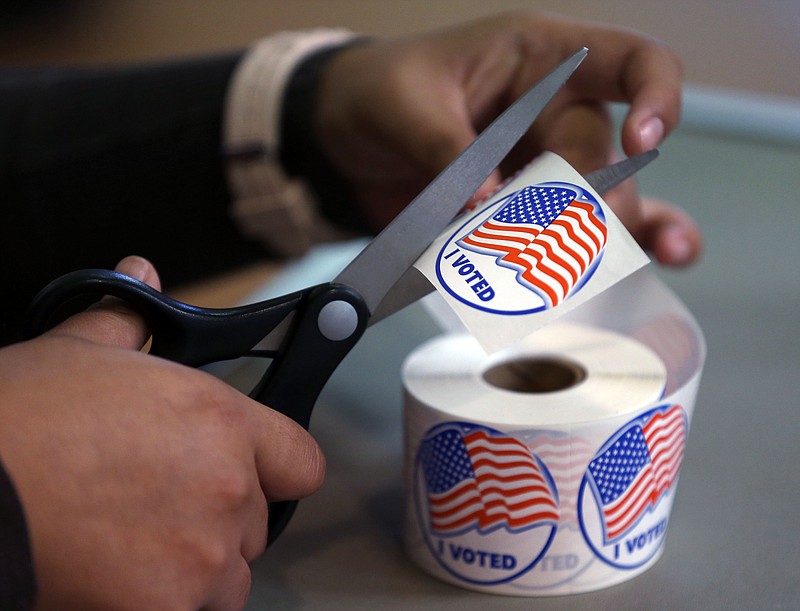It seems the forgotten tragedy of Donald Trump's election and the Mueller probe is that we know Russia interfered with our 2016 election, but our government isn't doing anything about it.
Even with 2020 elections just around the corner.
Special Counsel Robert Mueller's investigation and report made clear in the first sentence of the second paragraph the scale and scope of Russia's efforts: "The Russian government interfered in the 2016 presidential election in sweeping and systematic fashion."
Michael McFaul, a former U.S. ambassador to Russia from 2012 to 2014 and now director of the Freeman Spogli Institute for International Studies at Stanford, put it this way: "In 2016, Russia attacked the United States. More precisely, Russian President Vladimir Putin, his government, and his proxies deployed multiple strategies and instruments - media, doxing, covert operations, direct contacts with Trump associates, and cyber-attacks on U.S. electoral infrastructure - to influence the outcome of the 2016 U.S. presidential election, and more generally, to disrupt the electoral process."
McFaul is the editor and one of the authors of a new Stanford University white paper that puts forward "a comprehensive strategy" for what needs to be done to protect the integrity and independence of our elections.
The Stanford report offers a road map and - as The Washington Post notes - "shows how the nation remains shockingly near the beginning of the road."
Stanford researchers came away with more than 45 recommendations on how to protect America's democratic process. But three years after the Russian government planted trolls and bots on Facebook, Twitter and other social media sites to propagandize for Trump, hacked into the emails of officials on Hillary Clinton's campaign and probed the election infrastructure of at least 21 states for vulnerabilities, the president's team has not pursued a single one of these common-sense and often-mentioned fixes. On Wednesday, the morally corrupt Trump said he'd want dirt on his 2020 opponents - a de facto solicitation - and he'd feel no obligation to report it to the FBI.
The White House isn't the only foot-dragger. Senate Majority Leader Mitch McConnell, R-Kentucky, continues to block even the consideration of stand-alone legislation that would bolster election security.
The result is simple. A foreign government attacks us, and we attack each other. Then we continue to make it easy for the foreign power to attack us again.
McFaul, long a critic of this administration's lack of urgency about protecting our elections, outlines his worst fear.
"There is no greater nightmare than a computer being hacked on Election Day that distorts votes," he said when the report was released. "So, we have in the report several different recommendations about how to prevent that from happening - including at the top of the list, a paper trail for every ballot that's cast."
Other recommendations include securing our election systems before the election by allowing third-party computer code inspections and probes for vulnerabilities, as well as allowing political parties to assist states and candidates in beefing up cybersecurity. Both chambers of Congress have introduced legislation along these lines, but the measures are stalled.
Something like the Honest Ads Act is also necessary to require that platforms reveal who paid for political ads that do run - using the names of responsible individuals rather than only opaque organizations.
Social media sites should establish an official entity to coordinate with each other and the government about threats. As a nation, we should create high-minded media norms for the handling of stolen information, along with high-minded norms for political parties and candidates to not use stolen data or manipulated content.
The Stanford report's publication coincides with the launch of a new center at the school's international studies institute, the Stanford Cyber Policy Center, which will bring together researchers from across disciplines to address the threats cyber technologies pose to security and governance worldwide.
McFaul, in kinder wording, likens the new center to a stopgap measure in light of our government's failure to create a bipartisan, independent commission - similar to the commission established after the Sept. 11th terrorist attacks - to investigate what happened, how the United States responded, and what policies should be adopted moving forward to prevent or at least minimize new attempts by Russia or other countries to interfere in American elections.
It's a good start, and far more than what our government has even suggested, much less done.
To the contrary, the Trump administration persists not only in obstructing efforts to protect our votes, but even our access to facts as simple as how a citizenship question was added to the 2020 census. Last week, the president invoked executive privilege to block access by Congress to documents about how that question came about.
Clearly Trump doesn't believe the truth will set him free.
